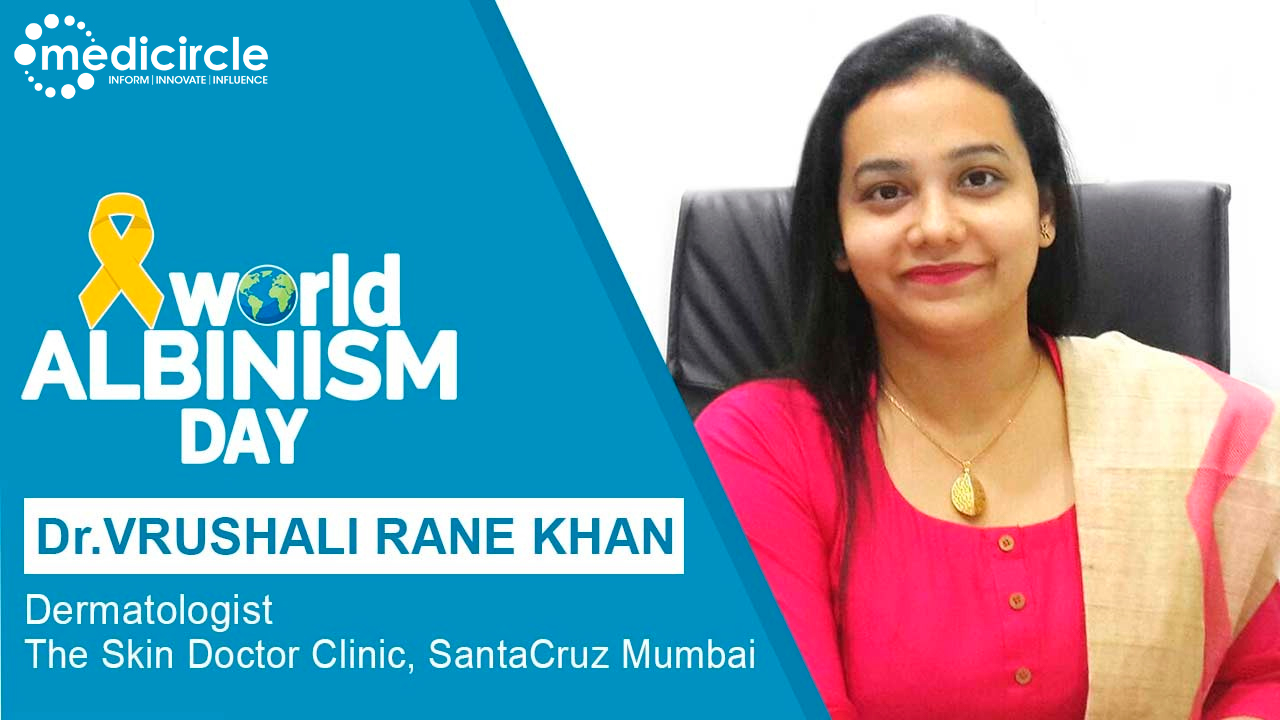Albinism is a rare disease according to the National Institutes of Health. It is characterized by a lack of melanin pigment in skin, hair, and eyes. Those with this condition are vulnerable to sun exposure as it increases the chances of skin cancer and severe visual impairment. International Albinism Awareness Day is observed every year on June 13, to highlight the rights of those born with albinism and increase awareness about this genetic condition. We at Medicircle, are conducting a series on this International Albinism Awareness Day to create understanding and prevent any misinformation against those who have it.
Dr. Vrushali Rane Khan is a Dermatologist Cosmetologist practicing in the western suburbs for the last nine years. Currently, she owns and practices at The Skin Doctor clinic at SantaCruz in Mumbai. She has been a topper in her university. She has presented papers at national conferences, co-authored publications in national journals, and has also participated in International conferences on Cosmetic Dermatology. For Dr. Vrushali every patient be it a celebrity or a commoner commands the same respect and time. Her mantra is to make her clients comfortable and confident in their skin. So, all the treatments are designed to respect their individuality.
Albinism gets mild as the person grows older
Dr. Vrushali voices, “Albinism is a genetic condition. There are two ways in which you inherit, one is an autosomal recessive way or 'x's linked way. Either way, it has been present since birth. As you grow older, the symptoms of albinism become a little milder. For eg - somebody is born with a very pale complexion, but as they grow older, they might develop a slight bronze kind of complexion. So, it is essentially present since birth and as the person grows older, it becomes a little mild.”
Albinism is quite rare in India
Dr. Vrushali expresses, "Albinism is rare in India. It is most commonly seen in Sub-Saharan Africa, where it is seen, and 1 in every 5000 people. In Europe and America, it is 1 in 20,000. And in India, it is even less like 1 in 25,000. It is there but awareness is not there, because the incidence of this condition is very low."
Why albinism affects skin, hair, and eyes
Dr. Vrushali says, “There are a lot of conditions that cause whitening of skin or depigmentation, like albinism and vitiligo. There's a lot of confusion amongst people between these. Albinism is a condition where melanocytes are present but their capacity to emphasize melanin is reduced. Vitiligo is a condition where the melanocytes are absent. Melanin is found in skin, hairs, and eyes, and something called leptomeninges covers your brain. And all of these are derived from the neural crest. So it is obvious that albinism is going to affect all of these, the skin, the hair, the eyes, as well as some parts of the brain.
Albinism has got no cure
Dr. Vrushali mentions, “Unfortunately, there is no cure for albinism. There has been a lot of research going on to find out the cure, but right now we aim at giving a good support system to the patient. As soon as an albino child is born, we give genetic counseling to the parents. Because it is inherited autosomal recessive, we talk to the parents about their future planning of kids."
Lifestyle modifications for albinos
Dr. Vrushali advises, "Sun protection is very important for albinos. The person has to apply sunscreen always and repeat it every two hours. Additionally, the person has to wear sunglasses, which are thick black Polaroid. Then the person also has to wear a wide rim hat and full sleeves clothes. And with all this, they have to avoid going out in the sun. So this is a major lifestyle change that they have to incorporate in their routine."
Important precautionary steps to be followed by albinos
Dr. Vrushali adds, “Melanin which is present in our skin is responsible for protecting us against skin cancers. And because this is absent in this condition, an albino is more prone to develop skin cancers. Because there is a lack of melanin in the eye as well, there are a lot of eye abnormalities that happen in albino patients. So there are refractive errors, some amount of nystagmus, some amount of difficulty in-depth perception, there could be some problems in the retina as well and photophobia. So you should have a good Ophthalmological evaluation in place and treatments accordingly. Surgery may not be required. Albinos should visit a dermatologist every six months to check for any signs of unnatural growth, like an actinic keratosis or cancer. And lastly, they have to be counseled about choosing a partner and what are the chances that they might pass it on to the next generation. So these are a couple of things that we have to take care of. There is no cure for it, but you can only ensure that it doesn't become so severe that you succumb to skin cancer or any major eye issues.
This condition makes you prone to a lot of other problems. So if you will protect yourself, you can lead a dignified normal life.”
(Edited by Renu Gupta)

 Albinism is rare in India and has got no cure. Sun protection is very important for people with albinism. Because of the absence of skin pigment called melanin, albinos are more prone to develop skin cancer. By taking necessary precautionary measures, these people can live a normal life, Dr. Vrushali Rane Khan, Dermatologist
Albinism is rare in India and has got no cure. Sun protection is very important for people with albinism. Because of the absence of skin pigment called melanin, albinos are more prone to develop skin cancer. By taking necessary precautionary measures, these people can live a normal life, Dr. Vrushali Rane Khan, Dermatologist
















.jpeg)











.jpg)




